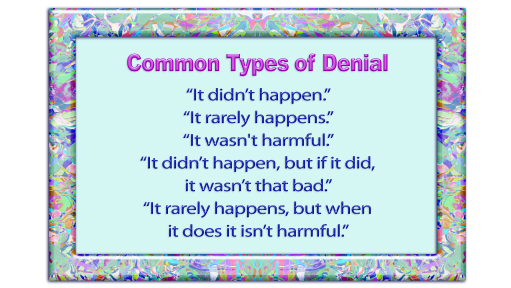Denial and D.A.R.V.O.
Denial


From Wikipedia, the free encyclopedia

Denial (also called abnegation) is a defense mechanism postulated by Sigmund Freud, in which a person is faced with a fact that is too uncomfortable to accept and rejects it instead, insisting that it is not true despite what may be overwhelming evidence. The subject may use:
- simple denial – deny the reality of the unpleasant fact altogether
- minimization – admit the fact but deny its seriousness (a combination of denial and rationalization)
- projection – admit both the fact and seriousness but deny responsibility.
![]()
Denial of responsibility
This form of denial involves avoiding personal responsibility by:
- blaming – a direct statement shifting culpability and may overlap with denial of fact
- minimizing – an attempt to make the effects or results of an action appear to be less harmful than they may actually be, or
- justifying – when someone makes a choice and attempts to make that choice look okay due to their perception of what is “right” in a situation.
Someone using denial of responsibility is usually attempting to avoid potential harm or pain by shifting attention away from themselves. For example:
-
Troy breaks up with his girlfriend because he is unable to control his anger, and then blames her for everything that ever happened.
Denial of impact
Denial of impact involves a person’s avoiding thinking about or understanding the harms his or her behavior has caused to self or others, i.e. denial of the consequences. Doing this enables that person to avoid feeling a sense of guilt and it can prevent him or her from developing remorse or empathy for others. Denial of impact reduces or eliminates a sense of pain or harm from poor decisions.
Denial of denial
This can be a difficult concept for many people to identify within themselves, but is a major barrier to changing hurtful behaviors. Denial of denial involves thoughts, actions and behaviors which bolster confidence that nothing needs to be changed in one’s personal behavior. This form of denial typically overlaps with all of the other forms of denial, but involves more self-delusion. Denial at this level can have significant consequences both personally and at a societal level.
See also: Victim blaming
Harassment covers a wide range of offensive behaviour. It is commonly understood as behavior intended to disturb or upset.
DARVO is an acronym to describe a common strategy of abusers:
Deny the abuse, then Attack the victim for attempting to make them accountable for their offense, thereby Reversing Victim and Offender.
Psychologist Jennifer Freyd writes:
…I have observed that actual abusers threaten, bully and make a nightmare for anyone who holds them accountable or asks them to change their abusive behavior. This attack, intended to chill and terrify, typically includes threats of lawsuits, overt and covert attacks on the whistle-blower’s credibility, and so on. The attack will often take the form of focusing on ridiculing the person who attempts to hold the offender accountable. The offender rapidly creates the impression that the abuser is the wronged one, while the victim or concerned observer is the offender. Figure and ground are completely reversed. The offender is on the offense and the person attempting to hold the offender accountable is put on the defense.
Related articles
- Defense Mechanisms – Psychology Definition of the Week (psychology.about.com)



excellent…I just followed this blog
LikeLike
I’ve never seen their actions broken down like this into DARVO, very interesting. I wish there was an effective way to counteract it though!
LikeLiked by 1 person
Giving it a name is a start… Now let’s start talking about it!
LikeLiked by 1 person
Rush Limbaugh is a master of DARVO.
LikeLiked by 1 person
You are spot on. Every article more accurate than the next. It is scary how many people are the target of these behaviors and we could all write the same exact lame excuse filled post from them.
LikeLiked by 1 person
I know someone like this and his name is Troy, I almost feel like God is speaking directly to me through this article, I have to get away from this man that I love. It’s time to start loving myself again as I once did before I became intimate with the devil.
LikeLiked by 1 person